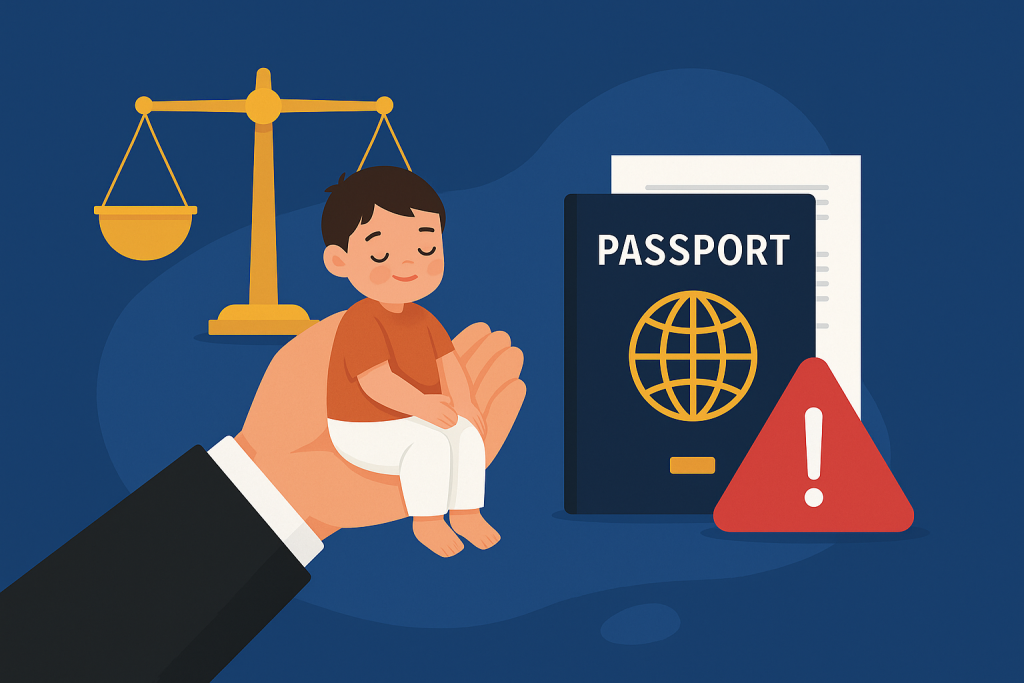
Adoption is a profoundly humanitarian activity, providing children in difficult circumstances with the opportunity to be nurtured and cared for in a family environment. However, when adoption crosses national borders — involving foreign elements — it ceases to be a purely charitable act and becomes a matter intertwined with national sovereignty, child rights, and complex legal responsibilities among the parties involved.
In practice, Vietnam has witnessed a significant number of intercountry adoptions, particularly with citizens of the United States, France, South Korea, and Italy. Although these cases often carry a positive humanitarian meaning, they also expose numerous potential legal risks — from registration procedures and verification of legal documents to post-adoption monitoring and the protection of the child’s rights.
1. Legal Framework
Intercountry adoption in Vietnam is currently governed by the following legal instruments:
- Law on Adoption (2010) – especially Chapter IV on adoptions with foreign elements;
- Decree No. 19/2011/NĐ-CP dated March 21, 2011, guiding the implementation of the Law on Adoption;
- The 1993 Hague Convention on Protection of Children and Cooperation in Respect of Intercountry Adoption (to which Vietnam acceded in 2011);
- Law on Children (2016) and related regulations on children’s rights;
- The 1989 UN Convention on the Rights of the Child (CRC).
These regulations ensure that adoptions involving foreign elements are carried out solely for the best interests of the child, and not for commercial gain, exploitation, or human trafficking.
2. Identifying “Foreign Elements” in Adoption
According to Article 28 of the Law on Adoption (2010), an adoption is considered to have a foreign element in the following cases:
- A foreigner residing abroad adopts a Vietnamese child;
- A Vietnamese citizen residing abroad adopts a Vietnamese child;
- A foreigner residing in Vietnam adopts a Vietnamese child;
- A Vietnamese citizen adopts a foreign child residing in Vietnam.
Thus, a “foreign element” may arise from nationality, residence, or territorial factors, making the determination of jurisdiction, applicable law, and post-adoption supervision more complex.
3. Potential Legal Risks in Practice
3.1. Risks in Procedures and Legitimacy of Documents
- Some individuals exploit adoption to conceal acts of child trafficking or disguised brokerage.
- Adoption dossiers may contain forged or improperly legalized documents.
- In the late 2000s, issues with “international adoption brokers” even led Vietnam to temporarily suspend adoption cooperation with several countries (2008–2010).
Vietnamese law requires that adoption dossiers from foreign applicants be verified by the competent authority in the applicant’s home country and submitted through the Department of Adoption under the Ministry of Justice (Article 41, Law on Adoption 2010). However, practical verification of overseas living conditions remains limited.
3.2. Risks Concerning the Child’s Rights After Leaving Vietnam
- Once adopted, many children lose contact with their birth families, hindering their right to know their origins.
- Post-adoption supervision (Article 44, Law on Adoption 2010) is often ineffective; some countries fail to send the required periodic reports on the child’s situation.
- In cases of neglect, abuse, or exploitation, Vietnamese authorities have little power to intervene, as the matter falls outside national jurisdiction.
3.3. Risks Related to Citizenship and Personal Rights
- Adopted Vietnamese children may change or lose their Vietnamese nationality.
- Some countries do not recognize dual citizenship, complicating the child’s legal status if they wish to return to Vietnam.
- When disputes arise (e.g., annulment of adoption, divorce of adoptive parents), the child’s best interests are not always adequately protected.
3.4. Risks in Annulment or Termination of Adoption
- Under Article 25 of the Law on Adoption (2010), annulment is permitted only in cases of abuse, exploitation, or serious violation of duties. However, once the child has been taken abroad, enforcing such decisions becomes extremely difficult.
- There is still no strong coordination mechanism between Vietnamese and foreign judicial authorities to supervise or protect the child after annulment.
3.5. Risks from International Intermediaries or Adoption Agencies
- Certain so-called “non-profit organizations” act as commercial intermediaries under the guise of humanitarian work.
- Although the law restricts operations to licensed foreign adoption agencies, some still collect and refer children from social welfare institutions for profit.
- Financial management, service fees, and “voluntary donations” from adoptive parents remain insufficiently transparent.
4. Recommendations and Solutions
- Strengthen verification and supervision: Conduct stricter dossier reviews and require regular post-adoption follow-up reports.
- Negotiate bilateral agreements with receiving countries to establish a clear child protection mechanism.
- Adopt digital and data-sharing systems for adoption management between Vietnam and central authorities of Hague Convention member states.
- Enhance the role of Vietnamese embassies in monitoring and verifying the adopted child’s living conditions.
- Strictly sanction illegal brokers and profiteering activities to ensure that adoption serves humanitarian purposes only.
- Raise awareness among social protection institutions and communities to prevent misuse of the adoption process.
5. Conclusion
Intercountry adoption carries profound humanitarian significance, ensuring children’s right to family care, development, and protection. However, behind each adoption file lies a web of complex legal, ethical, and jurisdictional issues — from verification and oversight to the safeguarding of children’s rights.
Therefore, to make this process truly transparent, lawful, and centered on the best interests of the child, strong coordination is needed among Vietnamese authorities, foreign receiving countries, and international organizations. Only through enhanced legal safeguards, responsible oversight, and strict prevention of exploitation can intercountry adoption fulfill its noble mission — ensuring every adoption is a story of love, not a legal loophole.
📞 CONTACT LEGAL CONSULTANT:
TLA Law is a leading law firm with a team of highly experienced lawyers specializing in criminal, civil, corporate, marriage and family law, and more. We are committed to providing comprehensive legal support and answering all your legal questions. If you have any further questions, please do not hesitate to contact us.
1. Lawyer Vu Thi Phuong Thanh, Ha Noi Bar Association
Email: vtpthanh@tlalaw.vn
2. Lawyer Tran My Le, Ha Noi Bar Association
Email: tmle@tlalaw.vn
Khuong Ngoc Lan

